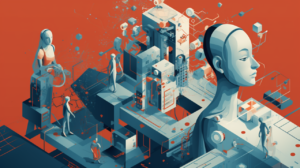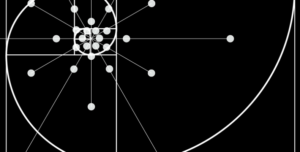The time for organizations to transform — their business, their people, their systems — is now.
Businesses large and small have traditionally struggled with organizational transformation. There is a significant emotional investment required to transform, not to mention a lot at stake. But organizations have neglected the deep personal impact that transformation has on people’s lives.
The result? Incremental change.
We no longer have time for incremental change. Small steps will not suffice in a world of exponential developments and declines. Transformation is required. Most of our current productive capacity is failing to operate within the constraints of viable life on the planet- accumulation of plastics in our oceans, over-drafting our aquifers, accumulation of CO2 in our atmosphere, and the list goes on.
The business models, the production systems, and the mindsets that drive our current state of destruction need to transform.
It’s helpful to remember that every system has within it the seeds of its own downfall. Death is a requirement for new life. Old business models get to die. Old ways of doing business get to die. Mindsets and even minds, get to die.
This is transformation.
Transformation Does Not Equal Change.
Change occurs all the time. As Alice said in her Wonderland experience “I knew who I was this morning, but I have changed several times since then.”
Change is a constant. Everything continues to evolve. Even the particles inside a diamond, supposedly lasting forever, rotate at the speed of 800m/s around the core.
Change is continuous and our experience of it, contiguous.
Transformation is a whole different experience. While all transformations are massive changes, not all changes lead to transformation.
Transformation is discrete.
Transformation is akin to a quantum jump from point A directly to point D. It requires a death experience, a ceasing in point A, before we can appear anew in point D.
And that is the crux: Nobody likes to die.
To transform, we have to be willing to let go of what we know, who we are, and embark on a journey through the night, through Hades, through the underworld of darkness and confusion, before we are born again into a new being. Transformation occurs as a massive shift. Something that was, is no longer the same thing.
People might not like change, but they dread transformation.
“The most important thing to remember is: to be ready at any moment to give up what you are for what you can become.” — W.E.B. Du Bois
Transformation Requires Realization of Purpose
Nobody is willing to give up who they are until the pain of the current state or the yearning for a future vision has become unbearable.
This goes for people, for teams, for organizations, and really for all systems. Until the wave reaches a breaking point, the system swells and sometimes even seems to go in a reverse mode.
The grandmother of systems thinking, Donnella Meadows taught us about the different between changing and transforming a system in her seminal work, Places to Intervene in a System.
The second best place to intervene in a system is with the goals — or with the purpose that system serves. Aligning the entire organizations around purpose that is so big it demands that the organization learn and reconfigure its plumbing is a fundamental part of building an organization aligned with the future. Peter Diamandis, speaker, engineer, physician and entrepreneur best known for being the co-founder of Singularity University, calls this the Massively Transformative Purpose — MTP. The goal is so big that you, your team, and the very structure of the organization have to continuously change to achieve it.
Transformation Requires Creation Leaders
But let’s remember that the ones creating the purpose, aligning with the purpose, adapting processes and business models to that purpose, are humans. And humans, by and large, hate to die. Organizational transformation asks that these humans accept the fact that their past mindsets or ways of being no longer serve them, and so they must change if they are to enter into the future which they design.
This is why Donella teaches that the most impactful, and most challenging, place to intervene in a system is in the mindset or paradigm of the people creating the system.
At LUMAN, we define the mindset shift we are fundamentally working toward as the shift from “I fulfill” to “I create”. An employee fulfills a job description. An entrepreneur or intrapreneur creates value. Those who are defining who they are based on what they get, are in the business of fulfillment. If you define yourself by your job, your paycheck or your car, you are fulfilling. Those who define themselves based on the value they create, are creators.
The fundamental shift from “I fulfill” to “I create” is the difference between an employee and an entrepreneur or intrapreneur. If your entire identity and sense of personal value has been built on the premise that your value in the world can be quantified by what you receive based on the role you fulfill — then shifting a belief that your value in the world is measured by the impact of what you create — is a transformation, a death of who you have been.
As organizational boundaries become more flexible, the identification of entrepreneurs and intrapreneurs will become increasingly fluid — so at LUMAN, we just call this group, “Creation Leaders”.
Creation leaders are those who have made the choice to take ownership of reality and are continuously developing the capacity to align personal systems and resources toward desired meaningful outcomes.
Will You Join Us?
Every individual within the organization has the potential for growing into #CreationLeadership. And we need you to. Now. If you are being called to transform your team, your organization, or your enterprise — that is your call to answer.
Need support? Pick up the phone and call me. Better yet, schedule with me here www.calendly.com/tirza
Never before have we been able to create at the scale and speed available now. Never before have we been more in need of solutions.
Never before has your genius, your creation been more needed.
With deep appreciate to Philip Horvath who is the original author of whole sections of this article. Thank you for being my collaborator.
***
Tirza Hollenhorst is an entrepreneur and a futurist. Trained as a biologist and engineer who previously built a technology company and facilitated international, cross-sector collaboration around corporate responsibility. Tirza is the founder and CEO of LUMAN where she brings her experience in business, science, and innovation together to transform organizations and prepare them for the future of work.
LUMAN stands for “humans with the lights on.”
Creating the future together starts with how humans operate. We offer project based workshops to help you accelerate outcomes while building your high-performing remote team.
Schedule time with us today to talk with us more about how you can connect your team to the future.





